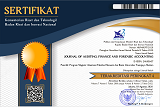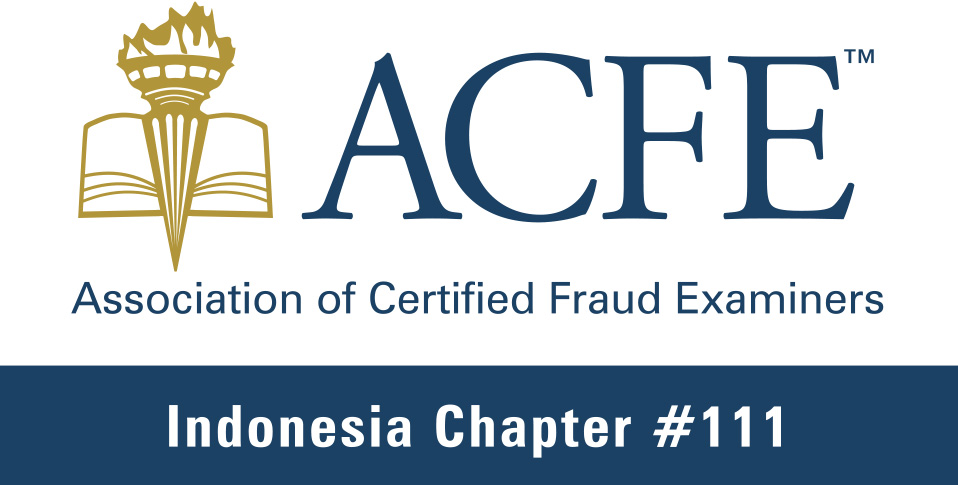THE EFFECT OF OWNERSHIP STRUCTURE ON FIXED ASSETS REVALUATION WITH TAX INCENTIVES AS MODERATING VARIABLES
Abstract
This study aims to determine the effect of ownership structure on fixed assets revaluation with tax incentives as a moderate variable. The ownership structure is indicated by firm size, fixed assets intensity, price ratio to book value and leverage. The data used in this study is secondary data obtained from the annual report of companies listed in Indonesia Stock Exchange (IDX) which amounted to 198 manufacturing companies in 2014 and 2015. This research uses sampling method that is purposive sampling with logistic analysis model. The results of this study indicate that firm size, fixed asset intensity, and leverage have no effect on fixed assets revaluation, while price ratio to book value negatively affects fixed asset revaluation. In addition, tax incentives are not a moderate variable.
Keywords
Full Text:
PDFReferences
Albrecht, W.D. and Richardson, F.M. 1990. Income Smoothing by Economic Sector. Journal of Business Finance & Accounting, 17 (5).713-730.
Atik, A. 2009.Detecting Income Smoothing Behaviors of Turkish Listed Companies through Empirical Test Using Dis cretionary Accounting Changes. Critical Perspective on Accounting, 20 (5), 591-613.
Bartov, E., Radhakrishnan, S., and Krinsky, I. 2000. Investor Sophistication and Patterns in Stock Returns after Earnings Announcements. The Accounting Review, 75(1), 43-63.
Beidleman, C. R. 1973. Income Smoothing: The Role of Management. The Accounting Review, 48 (4), 653-657.
Belkaoui, A. and Picur, R.D. 1984. The Smoothing of Income Numbers: Some Empirical Evidence on Systematic Differences between Core and Periphery Industrial Sectors, Journal of Business Finance and Accounting, 11 (4), 527-545.
Bushee, B.J. 1998.The Influence of Institutional Investors on Myopic R&D Investment Behavior. The Accounting Review, 73(3), 305-333.
Choi, T. H, Jinhan, P, Park, Sdan Choong, and Song, Y. 2013. Asset Revaluations: Motives and Choice of Item to Revalue. Asia-Pacific Journal Accounting & Economics. 20., 3.
Chen, C.L., Weng, P.Y., and Fan, H.S. 2016. Institutional Ownership, Income Smoothing and the Value-relevance of Accounting Numbers. Management Review, 35, 109-134.
Chung, R., Firth, M., and Kim, J.B. 2002. Institutional Ownership and Opportunistic Earnings Management. Journal of Corporate Finance, 8(1), 29-48.
Eckel, N. (1981). The Income Smoothing Hypothesis Revisited. ABACUS, 17 (1), 28-40.
Edmans, A. 2009. Blockholder Trading, Market Efficiency, and Managerial Myopia. Journal of Finance, 64 (6), 2481-2513.
Ergin, E. 2010. Income Smoothing: Evidence from Turkey. Working Paper, Kocaeli Unversity. Turkey.
Gujarati, D.N., & Porter, D.C. (2009), Basic Econometric.5th Edition, McGraw-Hill, Book Co., Singapore.
Hadani, M., Goranova, M., and Khan, R. 2011. Institutional Investors, Shareholder Activism, and Earnings Management. Journal of Business Research, 64 (12), 1352-1360.
Healy, P.M., and Wahlen, J.M. 1999. A Review of the Earnings Management Literature and Its Implications for Standard Setting. Accounting Horizons, 13(14), 365-383.
Hunt, A., Moyer, S.E, and Shevlin, T. 2000. Earnings Volatility, Earnings Management, and Equity Value. Working Paper, University of Washington.
Iatridis, George Emanuel and Kilirgiotis, G. 2011. Incentives for Fixed Assets Revaluatiion: The UK Evidence. Journal of Applied Accounting Research. 13 (1).
IDX (The Indonesian Stock Exchange). 2016. www.idx.go.id
Jensen, M.C. and Meckling, W.H. 1976. Theory of The Firm: Managerial Behavior, Agency Costs and Ownership Structure. Journal of Financial Economics, 3(4), 305-360.
Jiambalvo, J., Rajgopal, S., and Venkatachalam, M. 2002. Institutional Ownership and the Extent to Which Stock Prices Reflect Future Earnings. Contemporary Accounting Research, 19 (1), 117-146.
Kalelkar, R., and Nwaeze, E.T. 2011. Sarbanes-Oxley Act and the Quality of Earnings and Accruals: Market-Based Evidence. Journal of Accounting and Public Policy, 30 (3), 275-294.
Koch, B.S. 1981. Income Smoothing: An Experiment. The Accounting Review, 15(3), 574–586.
Li, S., and Richie, N. 2016. Income Smoothing and The Cost of Debt. China Journal of Accounting Research, 9 (3), 175-190.
Lin, Y. C. and Peasnell, K. V. 2000. Fixed asset revaluation and equity depletion in the UK. Journal of Business Finance and Accounting. No. 27: 359-393.
Mahastanti, L.A., and Pratiwi, S.O. 2014. Income Smoothing Phenomenon in Indonesia: Garbling Vs Signalling. Proceeding of The 2nd IBEA – International Conference on Business, Economics and Accounting, Hong Kong.
Mahmud, N.M. 2012. Income Smoothing and Industrial Sector. Financial Management, 50, 10248-10252.
Makaryanawati, M., and Milani, M. 2008. The Effect of Good Corporate Governance on Income Smoothing at Manufacturing Firms Listed on The Indonesian Stock Exchange (Pengaruh Good Corporate Governance Terhadap Praktik Perataan Laba Pada Perusahaan Manufaktur yang Listing di BEI). Jurnal Modernisasi, 4(1), 14-31.
Michelson, S., Wagner, J.J., and Wooton, C.W. 1995. A Market Based Analysis of Income Smoothing. Journal of Business Finance and Accounting. 22 (8), 1179-1193.
Piera, Frank Missioner. 2007. Motive for Fixed Asset Revaluation: An Emperical Analysis With Swiss Data. Jounal of Business Finance and Accounting. 34, 1025-1050.
Putri, I.F., and Natsir, M. 2006. Simultaneous Equations Analysis of Managerial, Institutional, Risk, Debt, and Policy Ownership on Dividend Policy in the Perspective of Agency Theory (Analisis Persamaan Simultan Kepemilikan Manajerial, Institusional, Risiko, Kebijakan Hutang, dan Kebijakan Deviden dalam Perspektif Teori Keagenan. Proceeding of National Simposium on Accounting 9, Padang, Indonesia.
Sherlita, E., and Kurniawan, P. 2013. Analysis of Factor Affecting Income Smoothing Among Listed Companies in Indonesia. Jurnal Teknologi (Social Sciences) Universiti Teknologi Malaysia, 64 (3), 17–23.
Stein, J. 1989. Efficient Capital Markets, Inefficient Firms: A Model of Myopic Corporate Behavior. Quarterly Journal of Economics, 104 (4), 655-669.
Suyono, E. 2016. Family Controlled Firm, Governance Mechanisms and Corporate Performance: Evidence from Indonesia. Journal of Economics, Business, and Accountancy Ventura,. 19 (1), 111 – 124.
Trisanti, T. 2014. Income smoothing practices and empirical testing using discretionary accounting changes. Journal of Economics, Business, and Accountancy Ventura,.17(1), 117 – 126.
Tucker, J.W., and Zarowin, P.A. 2006. Does Income Smoothing Improve Earnings Informativeness?. The Accounting Review, 81(1), 251-270.
Yulistia, Resti, Popi Fauziati, Arie Frinola Minovia, dan Adzkya Khairati. 2015. Pengaruh Leverage. Arus Kas Operasi. Ukuran Perusahaan, dan Fixed Asset Intensity Terhadap Revaluasi Aset Tetap. Simposium Nasional Akuntansi 18. Universitas Sumatera Utara, Medan 16-19 September 2015.
DOI: https://doi.org/10.21107/jaffa.v6i1.4327
Refbacks
- There are currently no refbacks.
Our Journal indexed by:
Our support tools using:



This work is licensed under a Creative Commons Attribution 4.0 International License.












